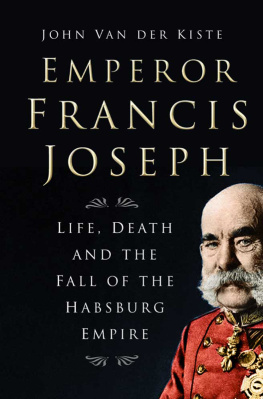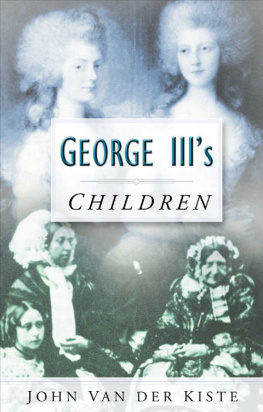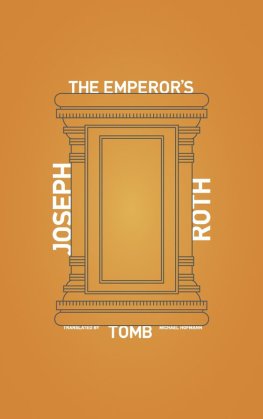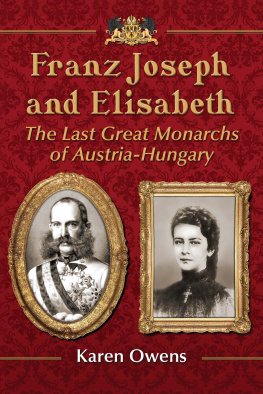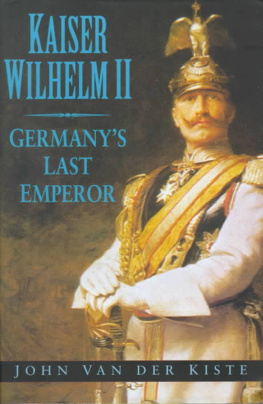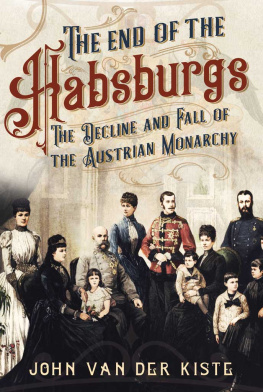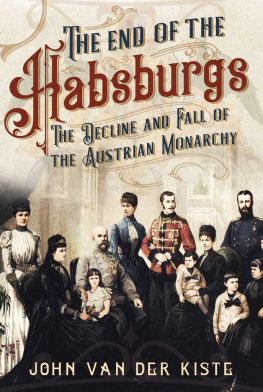
EMPEROR FRANCIS JOSEPH
ALSO BY JOHN VAN DER KISTE
Published by Sutton Publishing unless stated otherwise
Frederick III, German Emperor 1888 (1981)
Queen Victorias family: a select bibliography (Clover, 1982)
Dearest Affie: Alfred, Duke of Edinburgh, Queen Victorias second son, 18441900 [with Bee Jordaan] (1984)
Queen Victorias children (1986; large print ISIS, 1987)
Windsor and Habsburg: the British and Austrian reigning houses 18481922 (1987)
Edward VIIs children (1989)
Princess Victoria Melita, Grand Duchess Cyril of Russia, 18761936 (1991)
George Vs children (1991)
George IIIs children (1992)
Crowns in a changing world: the British and European monarchies 190136 (1993)
Kings of the Hellenes: The Greek Kings 18631974 (1994)
Childhood at court 18191914 (1995)
Northern crowns: The Kings of modern Scandinavia (1996)
King George II and Queen Caroline (1997)
The Romanovs 18181959: Alexander II of Russia and his family (1998)
Kaiser Wilhelm II: Germanys last Emperor (1999)
The Georgian Princesses (2000)
Gilbert & Sullivans Christmas (2000)
Dearest Vicky, Darling Fritz: Queen Victorias eldest daughter and the German Emperor (2001)
Royal visits in Devon and Cornwall (Halsgrove, 2002)
Once a Grand Duchess: Xenia, sister of Nicholas II [with Coryne Hall] (2002)
William and Mary (2003)
E MPEROR F RANCIS J OSEPH
L IFE , D EATH AND THE F ALL OF THE H ABSBURG E MPIRE
J OHN V AN DER K ISTE

First published in the United Kingdom in 2005 by Sutton Publishing Limited
The History Press
The Mill, Brimscombe Port
Stroud, Gloucestershire, GL5 2QG
www.thehistorypress.co.uk
This ebook edition first published in 2013
All rights reserved
John Van der Kiste, 2005, 2013
The right of John Van der Kiste to be identified as the Author of this work has been asserted in accordance with the Copyrights, Designs and Patents Act 1988.
This ebook is copyright material and must not be copied, reproduced, transferred, distributed, leased, licensed or publicly performed or used in any way except as specifically permitted in writing by the publishers, as allowed under the terms and conditions under which it was purchased or as strictly permitted by applicable copyright law. Any unauthorised distribution or use of this text may be a direct infringement of the authors and publishers rights, and those responsible may be liable in law accordingly.
EPUB ISBN 978 0 7524 9547 7
Original typesetting by The History Press
Contents
List of Plates
Preface
I am spared nothing, Emperor Francis Joseph of Austria is reputed to have said in June 1914, soon after being told the news that his nephew and heir, Archduke Francis Ferdinand, and his wife had been assassinated at Sarajevo. It was an echo of the words attributed to him almost sixteen years earlier after another assassination in the family, that of his own wife Empress Elizabeth, in Geneva.
The Emperor had indeed been spared little in his personal life. The violent murders of his wife and nephew had been preceded in 1889 by the suicide of his only son, Crown Prince Rudolf, and in 1867 by the execution of his brother Maximilian, Emperor of Mexico. In the longest reign of any European monarch of the last three centuries, almost sixty-eight years, he had also suffered two ignominious defeats in war, with Italy in 1859 and with Prussia in 1866. Both had done immense damage, albeit of a temporary nature, to his personal standing and that of the house of Habsburg, so much that he even feared abdication might be necessary. Never was martyrdom borne with greater dignity and resignation, wrote Walburga, Lady Paget, wife of the British ambassador to Vienna towards the end of the nineteenth century. His one fault is his weakness, but why this accumulation of terrible misfortunes, of which none of Shakespeares tragedies equals the horrors! Yet he weathered the storms, and by the time of his diamond jubilee in 1908 he had come to personify his empire in the same way that his contemporary Queen Victoria embodied hers.
A conscientious, well-meaning ruler and a kindly man, he has often been dismissed as dull and unintelligent if not stupid. Beside his more mercurial, wayward and tragic relatives, at first glance his long life may look uninteresting to some. Consequently, as a subject for biography he has often been neglected. One only has to compare the number of books published about his contemporaries in England and Germany, Queen Victoria and Emperor William II, to appreciate the difference.
This book intends to show him as a man against his family background the son of a forceful mother, the husband of a difficult, wilful wife, the father of three very different children (not including a daughter who died in infancy). It is also the portrait of a ruler who presided against the decline of the Austrian empire and a man of generally peaceful intentions, who ironically bore some responsibility for the start of what was at the time the most momentous conflict in European history, a war the consequences of which he did not live to see.
Acknowledgements
I wish to acknowledge the gracious permission of Her Majesty The Queen to publish extracts from material of which she owns the copyright; and the staff of the Public Record Office to quote from material in their possession. Sue and Mike Woolmans have been extremely helpful with regard to supplying illustrations and information during the writing of this book, while Coryne Hall, Karen Roth, Katrina Warne and Robin Piguet have also given invaluable advice and encouragement at various stages. As ever I am also indebted to the staff of the Kensington & Chelsea Public Libraries for access to their collection; and to my editors at Sutton Publishing, Jaqueline Mitchell, Jane Entrican and Anne Bennett.
Last but not least, many thanks to my wife Kim, who cheerfully accepted my afternoons, evenings and very early mornings in Habsburgland on the computer (to say nothing of hours spent trying to fix computer problems thanks also in this regard to Hannah, Caroline, James, Andy and Phil). She and my mother Kate provided unfailing encouragement and interest throughout, and without their work in reading the manuscript in draft form, the end result would surely be much the poorer.
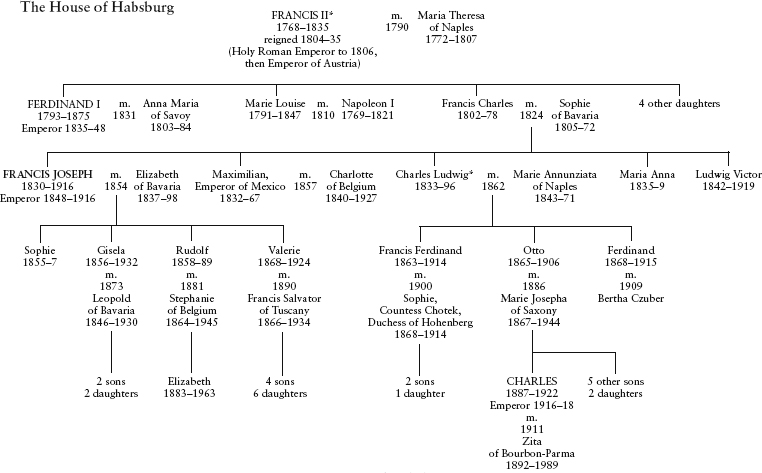
*Only the wives of Francis II and Charles Ludwig whose children were of major dynastic significance are included in this table.
ONE
Sovereign in Waiting
A rchduke Francis Joseph was born on 18 August 1830, third in line to the imperial throne of Austria after his uncle, Emperor Ferdinand, and his father, Archduke Francis Charles. This was the infant on whom would rest the future of the house of Habsburg, a dynasty which could trace its lineage back through several centuries, but with an increasingly chequered history by the early nineteenth century.
In 1792 Emperor Francis had been crowned Holy Roman Emperor in Frankfurt, the Holy Roman empire being in effect a hereditary possession of the Habsburgs. With the proclamation of a republic in France that year, and the rise of Napoleon Bonaparte, Francis sought a title to assert his superiority over the upstart Frenchman and also his authority over his Habsburg dominions. When Napoleon proclaimed himself Emperor of France in 1804, Francis thought it politic to take an hereditary imperial title, which would appear stronger than the elected office of Holy Roman Emperor, and he accordingly became Emperor of Austria. His countrys defeat at the battle of Austerlitz in 1805 resulted in a settlement which left Austria considerably diminished in prestige, and the creation of the Confederation of the Rhine a year later led to the final dissolution of the Holy Roman empire, as well as Franciss renunciation of the now redundant title. At the Congress of Vienna in 1815, summoned to determine the shape of Europe after the defeat of Napoleons France, the constituent territories of the Austrian empire were agreed. In addition to Austria and Hungary, they included Bohemia, Moravia, Galicia, Silesia, Slovakia, Transylvania, the Bukovina, Croatia-Slavonia, Camiola, Gorizia, Istria, Dalmatia, Lombardy and Venetia.
Next page
